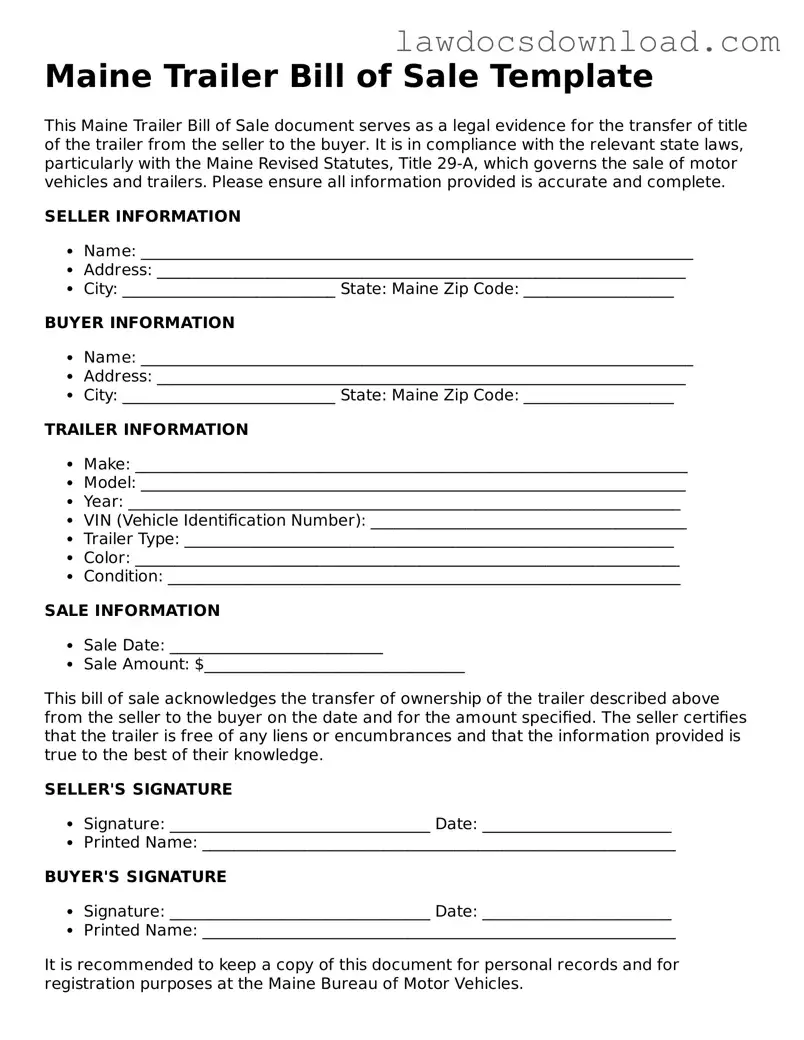The Maine Trailer Bill of Sale form shares similarities with a variety of other document types, each serving as a critical piece in the puzzle of legal, commercial, or personal transactions. Understanding these resemblances can provide a clearer picture of its role and importance.
Firstly, akin to the Automobile Bill of Sale, the Trailer Bill of Sale functions as a legal record confirming the transfer of ownership of a trailer from one party to another. Both documents ensure that the specifics of the transaction, including the sales price and identification details of the vehicle, are officially recorded. This commonality underscores their importance in providing proof of purchase and in facilitating the registration process of the vehicle under the new owner's name.
Comparable to a Real Estate Deed, the Trailer Bill of Sale is crucial for transferring titles. While the former involves real property, the latter concerns personal property - in this case, a trailer. Each document officially documents the change of ownership and is essential for the legal recognition of the new owner's rights over the property or item in question.
Similarly, a Receipt of Sale bears resemblance to the Trailer Bill of Sale as both serve as proof of transaction. A Receipt of Sale, however, can be more general, covering a wide array of items beyond vehicles, and is primarily used to prove that payment has been made and received. The specific mention of the trailer in the Trailer Bill of Sale pinpoints its focus on vehicular transactions, making it more specialized.
The Warranty Bill of Sale is another document that shares features with the Trailer Bill of Sale. Both can include terms that specify whether the item is being sold "as is" or with certain guarantees from the seller. This element is crucial for protecting the buyer's interests by outlining the condition of the trailer at the time of purchase and any responsibilities the seller bears post-sale.
Gift Deeds, which document the transfer of property without payment, contrast with the Trailer Bill of Sale in terms of monetary exchange but are similar in their legal function of transferring ownership. Whether for a trailer or real estate, these documents provide the legal framework required to formalize the change of ownership, ensuring it is recognized and recorded properly.
Loan Agreements also share common ground with the Trailer Bill of Sale when the purchase involves financing. While the Trailer Bill of Sale indicates the transfer of ownership, a Loan Agreement details the borrowed sum for the purchase, the repayment schedule, and other terms. These documents often work hand-in-hand during transactions that aren't outright purchases, highlighting the diverse financial dynamics involved in acquiring assets.
Likewise, the Equipment Bill of Sale resembles the Trailer Bill of Sale when transactions involve machinery or other types of equipment. Each document serves to record the specifics of the transaction, including the item's condition, purchase price, and identifying information, thereby facilitating a smooth transfer of ownership.
Last but not least, the Promissory Note can complement a Trailer Bill of Sale in instances where the buyer agrees to pay the purchase price over a period. Although the Promissory Note outlines payment terms rather than the transfer of ownership, it is crucial for defining the financial obligations tied to the acquisition. Together, these documents ensure both the legal and financial aspects of the transaction are clearly outlined and agreed upon by both parties.

